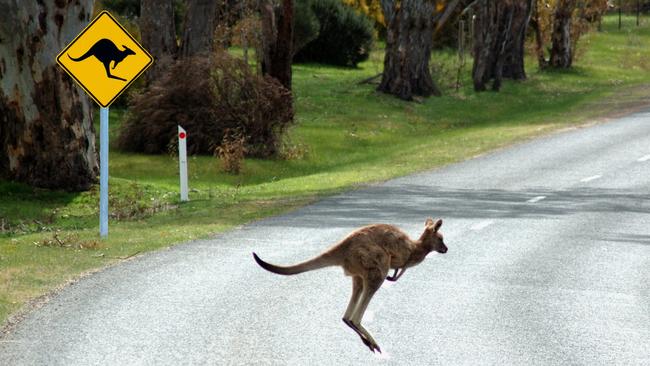Drivers urged to vigilant ahead of long weekend amid jump in kangaroo collisions with cars
Kangaroos are causing havoc for motorists, prompting a warning for holidaymakers to be vigilant ahead of the long weekend. SEE A LIST OF THE ANIMAL CRASH HOTSPOTS
SA News
Don't miss out on the headlines from SA News. Followed categories will be added to My News.
- Adelaide Hills cyclist fighting for life after being hit by a kangaroo
- How to get more from your The Advertiser digital subscription
Holidaymakers hitting the road for the long weekend are being urged to remain vigilant amid a jump in kangaroo collisions with cars.
And some of South Australia’s major roads and highways have been identified as hotspots for crashes involving animals.
Figures from the RAA show record numbers of drivers submitted kangaroo crash insurance claims last financial year.
There were 1670 kangaroo crash claims lodged in 2018-19, compared with 1249 the year before – a 34 per cent increase.
Kangaroos accounted for almost 85 per cent of all animal collision claims last year.
Dogs comprised nearly 6 per cent, followed by emus (3 per cent) and wombats (1 per cent).
RAA Insurance claims manager Hayley Cain said kangaroo crash claims peaked during spring.
“The state’s low rainfall has affected vegetation in rural areas. This is driving mobs of kangaroos into built-up areas, and contributing to the jump in collisions, “ Ms Cain said.
“Animals can definitely pose a serious risk to people’s safety, which is why we urge drivers to be cautious.
“The financial cost of colliding with an animal could range from a few thousand dollars to the car being a write-off, depending on the animal and the speed involved.’’

Ms Cain warned the Stuart Highway, Princes Highway, Sturt Highway, Victor Harbor Road, South-Eastern Freeway and Main South Road were hotspots for crashes involving animals.
“Crashing into an animal is an unfortunate and unpleasant experience, but we advise motorists not to brake heavily or swerve as this risks being in a more serious crash,” she said.
“Where possible, drivers should safely reduce their speed to avoid a collision with an animal, remain alert and remember that animals can be obscured by roadside vegetation.’’
Ms Cain advised motorists to try to avoid driving at dusk and dawn in rural areas when animals are more active.
“If you do hit and injure an animal, we advise you to seek help,” she said.
If the animal has been killed remove it from the road, if it is safe to do so, and contact the Traffic Management Centre on 1800 018 313 or your nearest police station.
